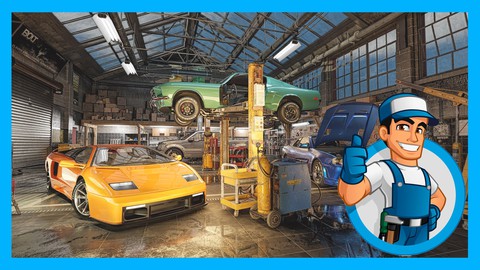Car Repair – Auto Technician Training Program | CRTC+ 2022

What you’ll learn
-
Understand Car basics
-
Learn how manual gearboxes works
-
Electricity Basics
-
Car Suspension System
-
Car Chassis Types
-
Car Electricity
-
Car Key Programming
-
Car Tuning
-
Gearbox Types
-
Engine Types
-
How Engine Works
-
Chip Tuning
-
And other awesome topics ->>>
Requirements
-
No requirements.
Description
The heart of every car is its engine. It produces the power that turns the wheels and electricity for lights and other systems.
Most automobiles are powered by an internal combustion engine. Fuel, usually gasoline or petrol, is burned with air to create gases that expand. A spark plug creates a spark that ignites the gas and makes it burn. This energy moves through cylinders in which pistons slide up and down. They are attached to rods that move a crankshaft. Normal car engines have four to six cylinders but there are also models with eight and sixteen cylinders. The turning movement is passed through the drivetrain to the drive wheels.
The engine and all parts that carry power to the wheels are called the drivetrain. It includes the transmission, drive shaft, differential, the axles and the drive wheels that move the car. While most cars have drive wheels in the front, some have them in the back. Cars that need to drive over all kinds of ground have a four-wheel drive.
The transmission controls the speed and torque. When a car travels at a normal speed on a flat road it does not need so much torque to keep it moving, but when you want to start a car from a hill the engine must produce more power. Gears control speed and power of the engine in different driving conditions.
In cars with manual transmission you have to change gears by pressing down the clutch with your foot and moving a lever. Cars with automatic transmission change gears without control by the driver. Lower gears give the car more torque and speed. When the car moves faster the transmission shifts to higher gears.
The driveshaft carries the power to the axle which is connected to the wheels. It has several joints which make the axle and wheels moveable as the car drives on uneven and bumpy roads.
The differential is connected to the rear end of the driveshaft. It lets the wheels turn at different speeds because in curves the outer wheels must travel a greater distance than the inner ones.
Who this course is for:
- Beginner car mechanics






